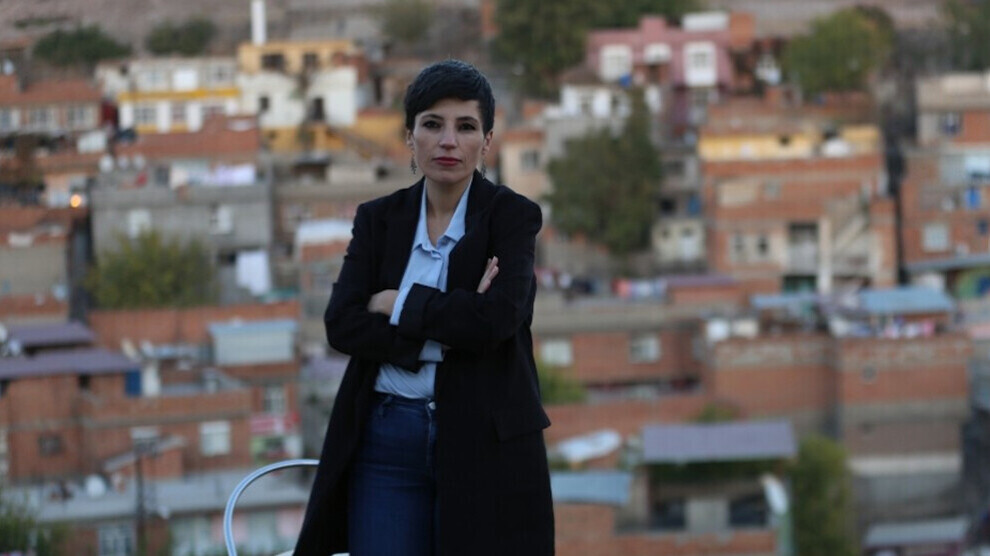Journalist Dicle Müftüoğlu released after 306 days in prison
After more than 300 days in custody, journalist Dicle Müftüoğlu, accused of terrorism, was released.
After more than 300 days in custody, journalist Dicle Müftüoğlu, accused of terrorism, was released.

After 306 days in pre-trial detention, a Turkish court has ordered the release of Kurdish journalist Dicle Müftüoğlu, editor of the Mezopotamya news agency (MA) and co-chair of the journalists' association Dicle Firat (DFG).
The court in Amed (Diyarbakır) ordered an exit ban against the 39-year-old journalist.
Müftüoğlu was arrested last year on 3 May, International Press Freedom Day, on suspicion of founding and leading a terrorist organization and alleged membership in a terrorist organization. She was taken into custody in Ankara and kept in police custody for several days at the instigation of the Diyarbakır Public Prosecutor's Office. She was then sent to the Sincan women's prison near Ankara.
Media institutions and trade unions said that the accusations against the journalist were related to her work for the free Kurdish press. She was detained as part of a wave of arrests shortly before the parliamentary and presidential elections.
The prosecution based its allegations against Müftüoğlu primarily on statements from the prosecutor's witnesses, which were also used in other trials against Kurdish press people or in the political show trial against the HDP known as the Kobanê trial.
One of them, identified as "anonymous witness K8Ç4B3L1T5", stated in another case against Kurdish media workers that he worked as a state agent at the Mezopotamya news agency. The Turkish judiciary has long maintained a pool of key witnesses for its political campaign of destruction against the Kurdish opposition, from which it draws as needed.
During the hearing, a confidential witness testified that Müftüoğlu worked at the Mesopotamia News Agency, was responsible for female employees, and represented the agency at meetings with women's organizations. The witness stated, "She participates in training organized under the name of the Dicle Fırat Journalists Association and is one of the people who decide on the assignments after the training. She is responsible for the women working at MA and also requests articles and news from women on significant days for the organization."
Following the witness's statement, the judge asked, "Are these acts of journalism or organizational activities?" The witness described how Müftüoğlu requested special reports about women on significant days and anniversaries. The judge then inquired if the witness had any direct knowledge of Müftüoğlu's membership in the organization, to which the witness replied, "No. I think she conducted activities on behalf of the organization based on these actions."
Dicle Müftüoğlu's lawyer, Resul Temur, challenged the witness by asking, "You mentioned earlier that you attended meetings with women's organizations in Diyarbakır with Dicle. When did these meetings take place, with which organization, and where?" The witness responded, "I don't remember the date or the place," and also stated they could not recall the names of any organizations at the moment.
"No concrete evidence, only allegations and slander"
During her defense statement via the Audio and Visual Information System (SEGBİS), Dicle Müftüoğlu, who has been a journalist for 15 years and worked for the Mesopotamia News Agency, the Active News Agency, and the Dicle News Agency, besides being a director and founding member of the DFG, began by addressing the confidential witness's statement. "I assume the witness has no knowledge about journalism," Müftüoğlu continued, "There is no concrete evidence, only allegations and slander. There is a professional hierarchy within the news center. You have to hold meetings to organize your broadcast schedule."
Müftüoğlu explained the daily operations of the news center, saying, "Reporters present their suggestions, and editors at the news center also make suggestions on current issues. This is not an instruction. It is entirely a professional matter." She further detailed, "Every agency, every newspaper has an editorial line and produces news accordingly. When there's a significant event like a mine disaster in İliç, all reporters go there, and the news center makes suggestions. Yesterday, eight women were killed by men. In such a country, of course, the news center will discuss this, will talk with women's organizations, and will cover their struggle."
Continuing her defense, Müftüoğlu stated, "I attend statements from all women's organizations in that city. That is my duty as a journalist. The headquarters of MA is in Istanbul, so the witness's claim is false. Not a single one of their claims reflects the truth. There is an atmosphere of criminalizing professional activity."